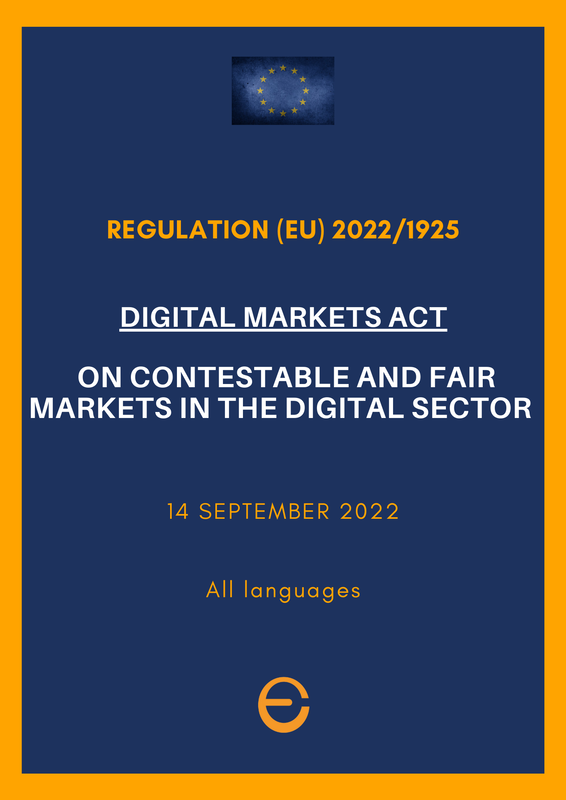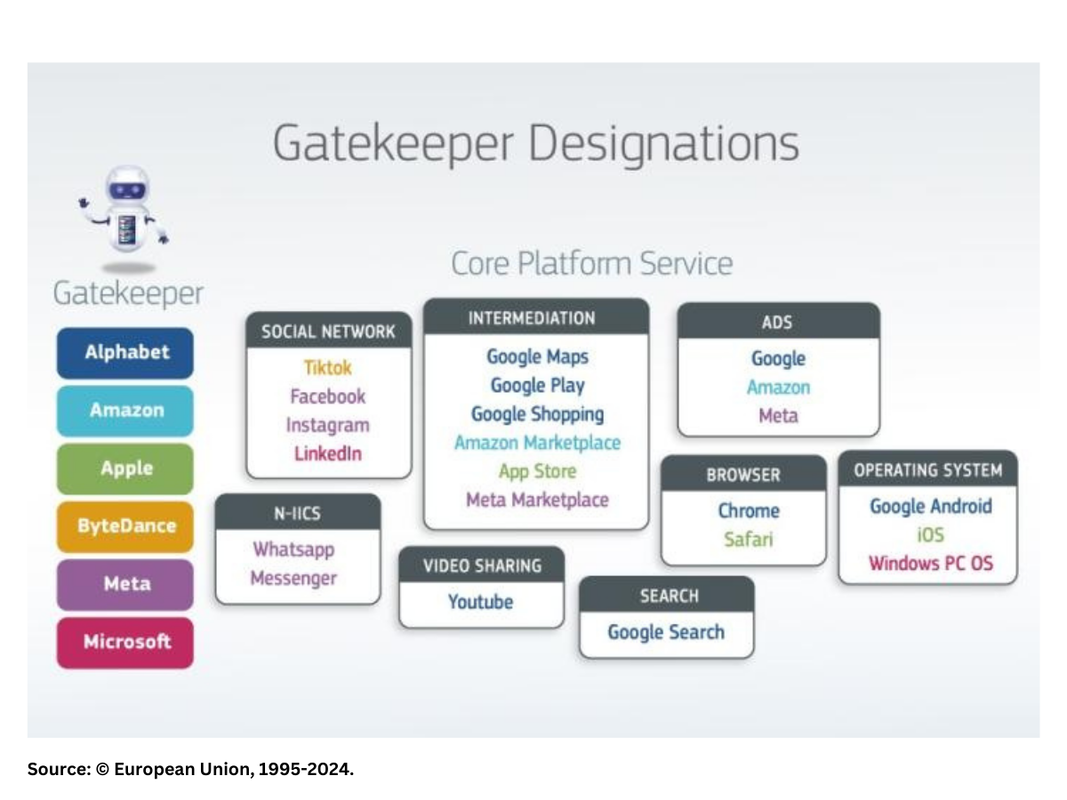|
Brussels, |
|
DIGITAL EUROPE
DMA - Digital Markets Act
This Regulation is in force as of 2 May 2023.
The Digital Markets Act (DMA) is a EU Regulation aimed at promoting fairness, transparency, and competition in the digital economy. Some large online platforms act as "gatekeepers" in digital markets. The Digital Markets Act aims to ensure that these platforms behave in a fair way online.
|
The main provisions of the DMA include:
|
Who are the gatekeepers?
DMA establishes a set of objective criteria for qualifying a large online platform as a so-called “gatekeeper”:
- has a strong economic position, significant impact on the internal market and is active in multiple EU countries. The firm’s annual EU turnover is at least €7.5 billion in each of the last three financial years, or its average market capitalisation/fair market value is at least €75 billion in the last financial year, and it provides the same core platform service (CPS) in at least three EU countries. The CPS has at least 45 million monthly active end users and at least 10,000 yearly active business users in the EU in the last financial year
- has a strong intermediation position, meaning that it links a large user base to a large number of businesses.
- has (or is about to have) an entrenched and durable position in the market, meaning that it is stable over time if the company met the two criteria above in each of the last three financial years
The European Union has identified the following entities as gatekeepers within its jurisdiction, thus making them subject to the provisions of the Digital Markets Act (DMA).
Legal Documentation
Download the Designation Decision
Core platform services:
Core platform services:
- Google Play | Case DMA.100002
- Google Maps| Case DMA.100011
- Google Shopping | Case DMA.100011
- Google Search | Case DMA.100004
- YouTube | Case DMA.100005
- Android Mobile | Case DMA.100009
- Alphabet's online advertising service | Case DMA.100010
- Google Chrome | Case DMA.100008
Download the Designation Decision
Core platform services:
Core platform services:
- Marketplace | Case DMA.100018
- Amazon Advertising | Case DMA.100016
Download the Designation Decision
Core platform services:
Core platform services:
- AppStore | Case DMA.100013
- iOS | Case DMA.100025
- Safari | Case DMA.100027
Download the Designation Decision
Core platform services
Core platform services
- Facebook Marketplace | Case DMA.100044
- Facebook | Case DMA.100020
- Instagram | Case DMA.100020
- WhatsApp | Case DMA.100024
- Messenger | Case DMA.100024
- Meta Ads | Case DMA.100035
Download the Designation Decision
Core platform services:
Core platform services:
- LinkedIn | Case DMA.100017
- Windows PC OS | Case DMA.100026
Obligations for the "gatekeepers"
The obligations for gatekeepers under the DMA include:
- Prohibition of unfair practices: Gatekeepers are prohibited from engaging in any unfair practices that may harm competition, such as using data collected from third-party businesses to compete with them, imposing conditions that make it difficult for users to switch to competing platforms, or blocking third-party access to important data or functionalities.
- Interoperability: Gatekeepers must ensure that their services are interoperable with other platforms and services, allowing users to seamlessly switch between different providers without losing access to their data and content.
- Data access: Gatekeepers must provide third-party businesses with access to the data that they need to compete fairly on the platform. This includes data related to user preferences, behavior, and transaction history.
- Transparency: Gatekeepers must provide clear and transparent information about their terms and conditions, algorithms, and ranking mechanisms to users and businesses, enabling them to make informed choices and understand how their data is being used.
- Non-discrimination: Gatekeepers must treat all businesses and users fairly and without discrimination, including providing access to the same functionalities and services on the same terms and conditions.
- Remedies and sanctions: The DMA establishes a range of remedies and sanctions that can be applied if gatekeepers fail to comply with these obligations. These include fines, structural remedies such as divestments or the unbundling of services, and behavioral remedies such as imposing conditions on the use of data or algorithms.
Benefits of DMA
- Business users who depend on gatekeepers to offer their services in the single market will have a fairer business environment.
- Innovators and technology start-ups will have new opportunities to compete and innovate in the online platform environment without having to comply with unfair terms and conditions limiting their development.
- Consumers will have more and better services to choose from, more opportunities to switch their provider if they wish so, direct access to services, and fairer prices.
- Gatekeepers will keep all opportunities to innovate and offer new services. They will simply not be allowed to use unfair practices towards the business users and customers that depend on them to gain an undue advantage.
Possible sanctions
Fines
Up to 10% of the company’s total worldwide annual turnover, or up to 20% in the event of repeated infringements
Periodic penalty payments
Up to 5% of the average daily turnover
Remedies
In case of systematic infringements of the DMA obligations by gatekeepers, additional remedies may be imposed on the gatekeepers after a market investigation. Such remedies will need to be proportionate to the offence committed. If necessary and as a last resort option, non-financial remedies can be imposed. These can include behavioural and structural remedies, e.g. the divestiture of (parts of) a business.



